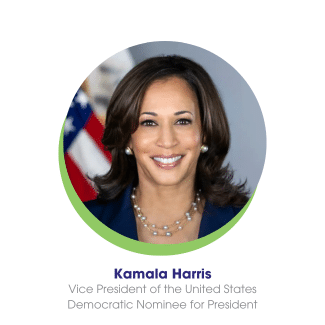Vice President Kamala Harris is telling potential voters that, if elected, she wants to raise the corporate tax rate to 28%, up from 21%. This hike would bring the rate halfway back to where it was in 2017, before it was lowered by her opponent, former President Donald Trump, in his first term in the White House.
- The corporate tax rate represents the percentage of a corporation’s profits that are taxed. The rate and structure have varied since being enacted in 1909.
James Singer, a spokesperson for the Harris campaign, called corporate taxes “a fiscally responsible way to put money back in the pockets of working people and ensure billionaires and big corporations pay their fair share.”
The unusual circumstances of the upcoming election – a non-sitting president who has already served one term in office facing the vice president of the current administration – makes the two candidates’ differing stances on this particular issue seemingly clear.
- In 2017, the Tax Cuts and Jobs Act was passed under the Trump administration, which was labeled “the most sweeping tax overhaul in decades.”
- This legislation, which went into effect in 2018, lowered the corporate tax rate from 35% to 21%.
While Harris has suggested raising that number to 28% – something that was not prioritized by the Biden administration – Trump has stated that, if elected, he intends to make permanent the cuts that were instituted during his first term, or even lower the rate to the 15%-18% range.
Promo Perspective
The corporate tax rate has proved to be a difficult balance to strike between prioritizing money for key social services and allowing relief to businesses that provide jobs and help sustain the economy.
- The nonpartisan advocacy group, The Committee for a Responsible Federal Budget, claims that Harris’ proposal to raise the corporate income tax rate to 28% would result in a reduction to the U.S. deficit by $1 trillion over a decade.

This statistic, however, would likely provide little comfort to the businesses, in promo and otherwise, that are responsible for accounting for this number through higher tax payments on their profits.
As part of her campaign, Harris has pledged to not raise taxes for individual Americans who make less than $400,000 per year, but this does not account for how they could potentially be affected by a corporate tax rate. Any given business’s ability to shoulder a 7% increase in taxes could theoretically be cause for new – and potentially difficult – decisions regarding wages or investment priorities.
With less than three months until the election, both candidates have provided glimpses of their economic intentions that may be of relevance to promotional products companies of varying sizes. Recently, Trump told voters that he plans to impose import tariffs of “10%-20%” on certain foreign countries, which could result in supply chain ramifications.
Would Harris Have The Authority For Such A Tax Hike?
While Harris may be campaigning on a 7% corporate tax rate hike, it is worth pointing out that a win for her in November would not guarantee such legislation would follow.
“It’s important to note that any changes to tax law would require legislation through the House and Senate,” says Rachel Zoch, PPAI’s public affairs manager and research editor.
Much like the presidential election, the races for control of the Senate and House between the Republicans and Democrats are expected to be tightly contested. Assuming Congress would vote on such an issue down party lines, it would be unlikely that a Harris administration would be successful in passing a corporate tax hike without Democratic control of at least one of the other branches of government.


